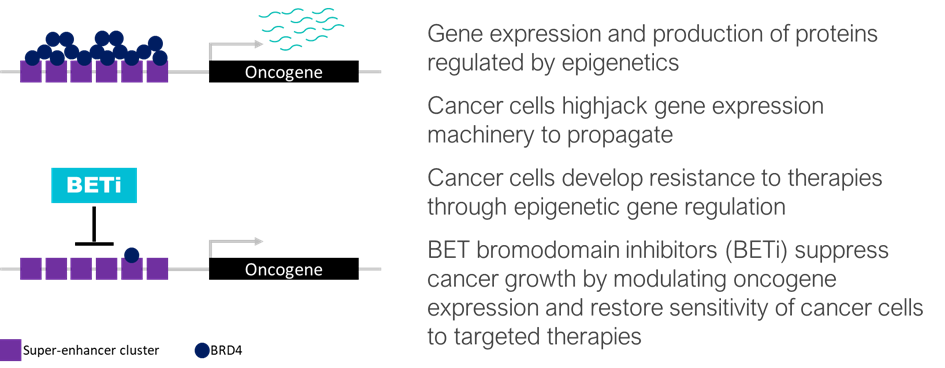Inhibition of BET proteins is an epigenetic approach to treat cancer. BET inhibitors have shown promising efficacy in multiple preclinical cancer models, with clinical validation emerging as trials are completed. Our oncology program centers around developing best-in-class BET inhibitor for the treatment of cancers with significant unmet need. Our lead candidate, ZEN-3694, is a structurally novel, orally administered, small molecule BET inhibitor. ZEN-3694 is currently in mid stage clinical trials for multiple oncology indications. Zenith Epigenetics has the most advanced BETi in the world for solid tumors is the first and only company to show clinical proof of concept with a BET inhibitor in multiple solid tumors.
BET inhibitors target cancer in a fundamentally different way than most chemotherapeutic drugs and existing targeted therapies (including kinase inhibitors, hormone modulators, and immunotherapies). The body has evolved natural processes which defend against the unchecked growth of its cells, which limit proliferation and can initiate apoptosis – or programmed cell death – when growth starts to get out of control. A hallmark of cancer is the expression of “oncogenes” within tumor cells, which interfere with the normal checks on cell division and free tumors to grow rampant. BET inhibitors act by repressing expression of oncogenes, allowing the body’s natural checks and balances to retake control, inhibiting cell proliferation, and inducing apoptotic death of the cancerous cells.
Oncogene overexpression in tumor cells is often driven by protein structures known as “super-enhancers”, which are formed to promote expression of specific sets of genes, including oncogenes. Super-enhancers are held together by multiple specialized proteins, including BET protein family members. By binding to the BRD2, BRD3, BRD4, and BRDT bromodomains, BET inhibitors prevent super-enhancers from forming and the subsequent overexpression of oncogenes. Since healthy, non-cancerous cells may lack super-enhancer formation, BET inhibitors specifically target super-enhancer driven overexpression of oncogenes in tumor cells over normal cellular processes.
